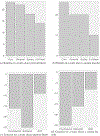Attitudes Regarding Enrollment in a Genetic Research Project: An Informed Consent Simulation Study Comparing Views of People With Depression, Diabetes, and Neither Condition
- PMID: 31328612
- PMCID: PMC6733621
- DOI: 10.1177/1556264619862467
Attitudes Regarding Enrollment in a Genetic Research Project: An Informed Consent Simulation Study Comparing Views of People With Depression, Diabetes, and Neither Condition
Abstract
In this study, participants with a self-reported history of depression, diabetes, or no illness underwent a simulated informed consent process for a hypothetical genetic study related to depression or diabetes. Participants completed a survey assessing their perceived understanding of the research process, perceptions of its risks and benefits, their satisfaction with the informed consent process, and their readiness to make a hypothetical enrollment decision. All participants indicated strong readiness to make an enrollment decision regarding the research characterized in the simulation. Participants reported understanding the consent process relatively well and being generally satisfied with it. Greater concerns were expressed regarding psychosocial risks than biological risks for genetic studies on mental disorders. Our study documented positive attitudes toward volunteering for research that involved the collection of genetic data.
Keywords: attitudes; depression; diabetes; genetics; informed consent; research participation.
Figures
References
-
- Barata PC, Gucciardi E, Ahmad F, Steward DE. 2006. Cross-cultural perspectives on research participation and informed consent. Soc Sci Med 62:479–490. - PubMed
-
- Calnan M, Montaner D, and Horne R 2005. How acceptable are innovative health-care technologies? A survey of public beliefs and attitudes in England and Wales. Social Science & Medicine 60: 1937–1948. - PubMed
-
- Carpenter WT Jr., Gold JM, Lahti AC, et al. 2000. Decisional capacity for informed consent in schizophrenia research. Archives of General Psychiatry 57(6): 533–8. - PubMed
Publication types
MeSH terms
Grants and funding
LinkOut - more resources
Full Text Sources



